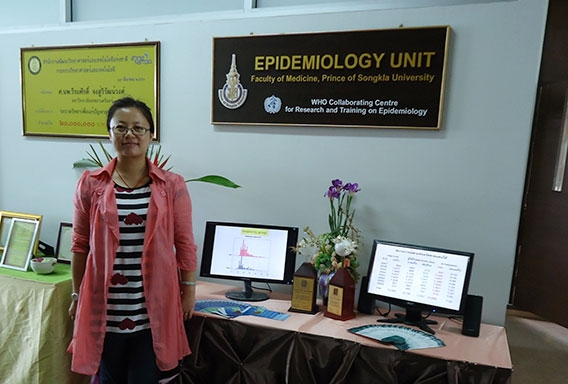CMB Profile: Zhang Nan

Zhang Nan is a policy researcher at the Research Institute for Health Policy, Inner Mongolia School of Health Management, Inner Mongolia University, currently pursuing PhD studies in health policy at Prince Songkla University. CMB supports Zhang Nan and other talented scholars in its Rural Health Network, connecting them with advances in policy research and professional education both in and outside China. In an interdependent world, such regional exchanges provide health researchers opportunities to advance their knowledge, learn from one another, and produce ideas aimed at improving health quality and equity.
Q: You’ve been working towards a PhD at Prince of Songkla University (PSU). How did you come to study in Thailand at PSU?
A: In 2009, my school— Inner Mongolia University— joined the CMB Western Rural Health Network. As part of this network and with the support of CMB, we began working on research projects and academic exchange programs. After several years, it became clear to us that the current capacity of health policy researchers to produce evidence for policy cannot meet the ever-increasing demand of local health policy development. CMB is working on addressing this issue, and in 2012 it funded the first group of Western Rural Health Network member schools’ faculty to pursue doctoral studies in Thailand. After an individual application, school recommendation, and admissions interview, I was very fortunate to be selected by CMB to pursue PhD studies at Prince of Songkla University in Thailand.
Q: What was the most important or interesting thing you have learned during your studies in Thailand?
A: My academic ability has improved tremendously because I have learned basic statistical and epidemiological research methods. The mastery of this knowledge has been my most important achievement thus far. In fact, after one year of study in Thailand I’ve realized that a lot of theories and methods that I learned and utilized in China are wrong. I think it is real progress to recognize mistakes and change them moving forward. In addition, I’ve developed a habit for examining information more rigorously. Now, when I am reading research reports or conducting my own research activities, I will always ask myself if the evidence presented is sufficient and if the ideas presented support the research process. This is an essential habit to cultivate as a researcher.
Q: What did you enjoy, and what did you find difficult, about living in Thailand?
A: When I began studying in Thailand, there were a lot of things that were challenging. I had a difficult time adjusting to the climate and communication was also difficult. But luckily, these problems quickly became less difficult. Now, looking back over the past year, I realize it was full of wonderful memories. I’ve come to really love Thai culture. Thai people are very friendly, humble, polite, and down to earth; they also work very hard.
Q: What do you think China can learn from Thailand?
A: In Thailand, I participated on a survey about Thailand’s primary health system, which made a deep impression on me. In the Thai countryside, there is one volunteer for every ten families. This volunteer works with the local health centers to serve the rural people in a rural primary healthcare network. I remember one of my professors said that this approach was actually developed from the Chinese experience of barefoot doctors about 50 years ago. It’s interesting that this system, which was originally Chinese, is now being re-introduced by Thai scholars as a model for China. I think China, given its long history and rich culture, should take the time to carefully reflect on its own experience rather than push forward; there may be important lessons in the past. It is not that we lack experience; we simply the capability to apply our experience to implement solutions to problems in China. We still have a long way to go for the development of China's health system and health policy research, and young scholars can work together to devote themselves to this task.
Q: What will you be able to do differently after you return to China?
A: I’m one of the first group of scholars from our school to “go out;” so my greatest desire is to take what I have learned and disseminate that learning to other young teachers and students at Inner Mongolia University. I hope to bring the experience of health reform in Thailand back to China, and use my new knowledge and skills to assist the health developments in Inner Mongolia. There is a saying: “A journey of one thousand miles begins with a single step.” For me, the first steps on my journey are to study diligently for the next two years and graduate. Then, I can help collect data and do my job at Inner Mongolia University well—be a good teacher, teach students well, and help young teachers grow. But my true wish is that this journey will allow me to develop into a skilled policy researcher who can contribute significantly to the development of better health outcomes in Inner Mongolia—and even the entire Chinese nation!
